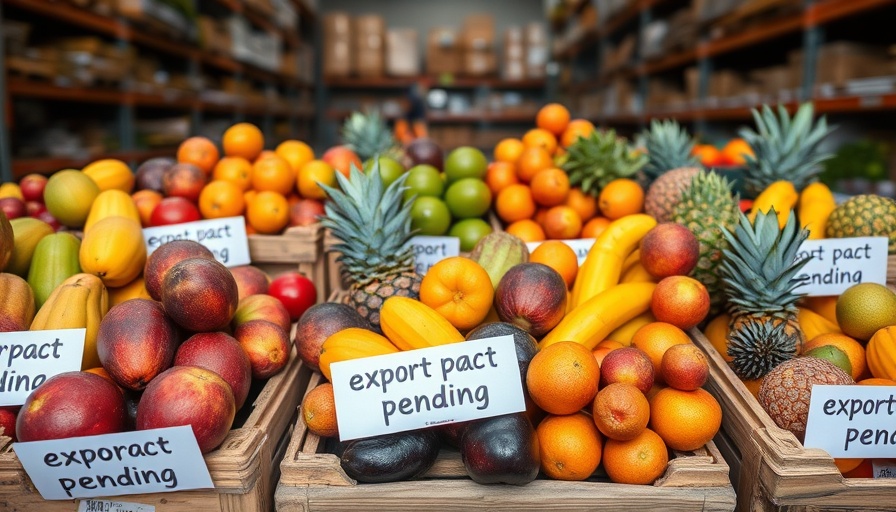
The Fading Legacy: French Investments in Algeria
The diplomatic tensions between Paris and Algiers are taking a toll on French investments in Algeria. Strained relations over a range of issues, including migration, colonial history, and territorial disputes, have prompted French firms to dramatically reduce their presence in the North African country. The fallout is clearly visible in the market: several major French companies have already exited, including car manufacturer Renault, which operated in Algeria until 2020.
Insights into the Current Economic Landscape
As of early 2025, the economic relationship between the two nations appears to unravel further. Following Algeria's decision to pivot towards other partners like the United States and China, French businesses find themselves at a crossroads. The once-prominent French footprint in Algeria has diminished significantly, with some reports indicating that French investments are failing to meet either technological transfer or market demands.
In stark contrast, Algeria's hydrocarbon exports to France have increased, likely as European nations seek alternative sources following sanctions on Russia post-Ukraine invasion. Reports claim that in 2023, hydrocarbons constituted a substantial portion of Algeria's exports, underscoring a shift in economic dynamics favoring Algeria, even while trade relations continue to falter.
Decolonization and its Impact on Trade Relations
The historical context of decolonization plays a crucial role in understanding the current tensions. Algerians continue to grapple with the implications of France's colonial legacy, which have instilled a considerable degree of skepticism towards French intentions in economic and social dealings. As Algeria actively seeks to assert its sovereignty, the push for a more equitable trading relationship becomes paramount.
This shift is viewed not only through an economic lens but also through the prism of cultural heritage and national identity, as Algeria enhances its ties with fellow African nations to establish a Pan-African narrative that celebrates independence, autonomy, and mutual respect.
Strategic Moves: Algeria's New Partnerships
In opting for relations with countries like China, Turkey, and Qatar, Algeria is not merely rebooting its economic alliances but is also reinforcing its position on a global stage that increasingly values equitable partnerships. Recent developments highlight the government's commitment to bolstering alliances that respect Algerian sovereignty while facilitating foreign direct investment. This approach aligns with broader global trends that prioritize sustainable development and ethical governance, particularly among African nations.
Additionally, Algeria's efforts are bolstered by the African Continental Free Trade Area (AfCFTA), aiming for economic integration and collective growth across the continent. Enhanced trade agreements with various partners reflect Algeria's forward-thinking orientation, driving development while also addressing contemporary challenges like unemployment and youth empowerment.
What Lies Ahead: Future Predictions for French Investments in Algeria
The trajectory of French investments in Algeria faces significant uncertainties as traditional ties fray. Analysts predict that, without a substantial diplomatic thaw, French firms might continue to limit their operations or exit completely, leaving a void that could be filled by increasingly competitive non-European partners. The economic landscape suggests room for optimism among emerging markets and small business entrepreneurs who might thrive amidst renewed competition.
The ground reality of French-Algerian economic relations appears to be shifting, with the potential for transformative outcomes hinging on Algeria's ability to navigate its international partnerships effectively while maintaining its identity. Algeria is increasingly focused on fostering innovation and entrepreneurship, an agenda that could lead to revitalized sectors in education, technology, and renewable energy, thus realigning its economy for the better.
Decisions to Make and Actions to Embrace
For investors considering entering the Algerian market, understanding the local context and navigating the evolving geopolitical landscape is essential. The shift in Algeria’s economic relationships invites a sense of urgency for adaptability and innovation as the nation looks to redefine its trade avenues.
Investors must consider exploring sectors that align with Algeria’s national interests, which include renewable energy and technology startups. Engaging in capacity building and fostering local partnerships can also facilitate smoother market entry and enhance potential returns.
Call to Action: Embrace the Innovation Framework
To seize the opportunities that Algeria presents, it’s time for business leaders and entrepreneurs to invest in fostering innovative partnerships that respect local dynamics. Engaging with Algeria on technology transfer and sustainable development not only enables vital economic growth but also establishes enduring ties that transcend historical grievances. By embracing Algeria’s evolving role as a key player in the regional economy, stakeholders can foster a new era of collaboration and prosperity.
 Add Row
Add Row  Add
Add 




Write A Comment